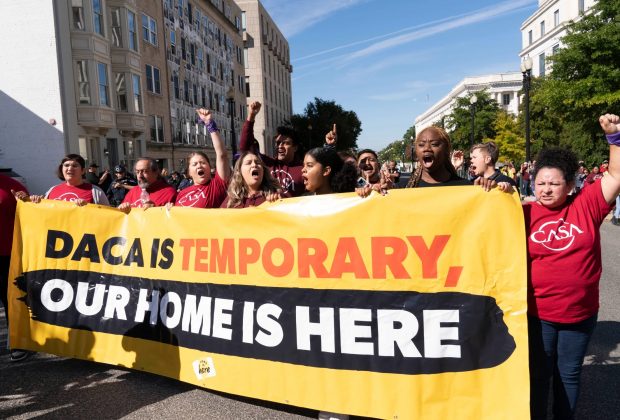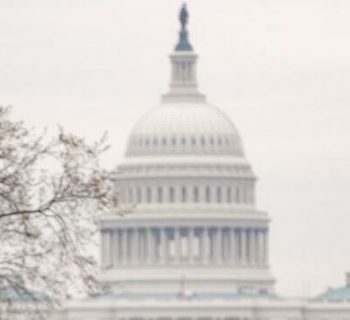Opinion by Kristin Yarris, Mariela Nunez-Janes, Chrissy Getrich and Sarah Horton | The Hill | DEC. 9, 2022 | Photo by Jose Luis Magana
As Congress continues its lame-duck session, it is urgent that it act to make the protections of the Deferred Action for Childhood Arrivals (DACA) program permanent.
DACA has been the most successful immigrant integration policy in decades, allowing nearly a million undocumented youths to obtain jobs and plan for their futures.
Yet when a decision by the Fifth Circuit Court of Appeals maintained a stay on the program in October, it cast its future—along with the fate of these youths—into doubt. As we head into a new legislative session with a Republican-controlled House, lawmakers have a narrow window of time to put an end to this uncertainty and provide these youths with a pathway to citizenship.
Since President Obama signed an Executive Order in 2012 initiating the program, DACA has granted undocumented young people a stay of deportation and improved access to education and employment by making them eligible for work permits. Yet in the past five years, presidential and legal challenges to DACA have caused great uncertainty for these young adults, leaving them at the mercy of federal court decisions.
The most recent decision sends the case against DACA back to Texas-based federal district court judge Andrew Hanen, who declared the program unlawful just last year. Should the case make its way to the Supreme Court in 2023, the conservative-leaning court is unlikely to uphold DACA protections. Congress must act now to protect these youths whose lives have long been held hostage by political jockeying.
As social scientists, we have documented the positive impact of DACA on the well-being, educational success, and career trajectories of young people, their families, and communities. DACA helps college graduates enter the professional workforce, in turn improving their financial security and the well-being of their families and communities. This includes the students who we, as faculty at public universities across the country, have had the opportunity to teach, mentor, and learn alongside.
Rebeca and Yvette, twins who migrated from Peru to Maryland when they were 15, spent eight years working under the table at a fast food chain before they received DACA. With DACA, they were able to complete their college degrees and pursue careers in information technology and nursing/social work. This in turn allowed them to help their undocumented family members to become more economically stable, purchase a home, and take care of health needs.
Indeed, research from the Immigration Policy Lab reveals that DACA’s positive impact on family well-being even extends across generations to support the mental health of DACA recipients’ U.S.-born children.
DACA recipients also benefit the larger society. DACAmented adults have been playing critical roles on the frontlines of the coronavirus response through their positions in industries such as health care, education, and food services. They pay $6.2 billion in federal taxes and $3.3 billion in state and local taxes annually. Their earnings, enabled by lawful employment, in turn help the economy. DACA-eligible residents’ total spending power is estimated to be about $20.2 billion.
Yet DACA was never meant to be a permanent solution, and its status as an executive action has left its future in doubt. As university educators, we have long seen our students struggling with the precariousness of their legal status and with fears about their future. Indeed, the constant threats to end the program negatively impact recipients’ physical, mental health, and their ability to plan for the future.
One of our students in Texas, now an adult with her own children, said she is carrying the long-term traumatic effects of living for decades with her future in limbo. Another in Colorado lost a job as a nurse due to the constant precarity, unable to renew her legal status in time due to shifting court rulings.
As new applications have been halted by the courts and DHS, this has left other students we teach—who could have qualified for the program—questioning the value of a college degree because they lack pathways to legal employment. Granting DACA recipients permanent legal status makes good on lawmakers’ promises to stop these youths from being political pawns.
Although protecting DACA recipients is vital, it should not come at the expense of persecuting other migrants. The current bipartisan compromise Sens. Thom Tillis (R-N.C.) and Krysten Sinema (I-Ariz.) are drafting would extend Trump-era expulsions of vulnerable asylum seekers, a policy long in violation of the U.S.’ stated commitment to asylum. Immigrant rights should not be a zero-sum game, in which granting the security of undocumented youths requires penalizing undocumented adults.
We must protect DACA recipients because their future belongs in the United States. Granting them a pathway to citizenship is in the best interests of the nation, allowing the U.S. to reap the returns of its investment. In the last days of the 117th Congress, lawmakers must step up to end the years of legal uncertainty surrounding DACA through swift congressional action.






